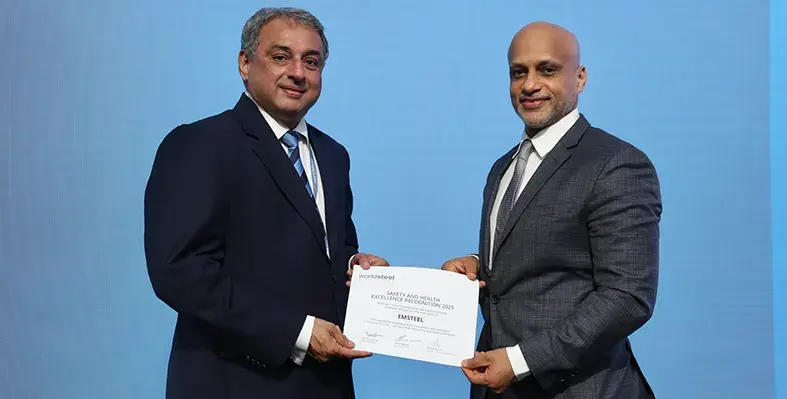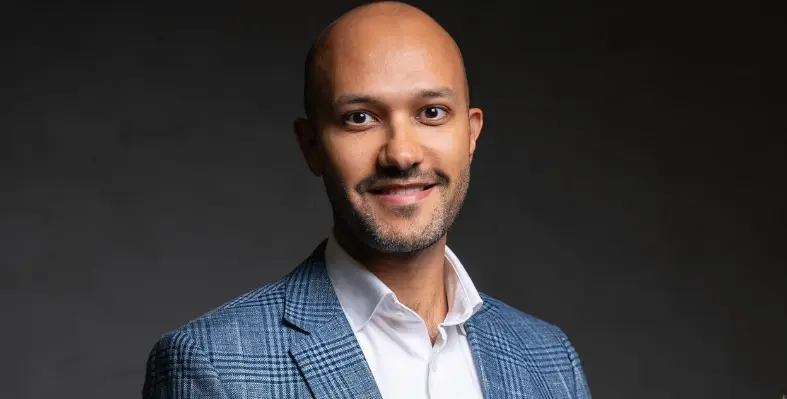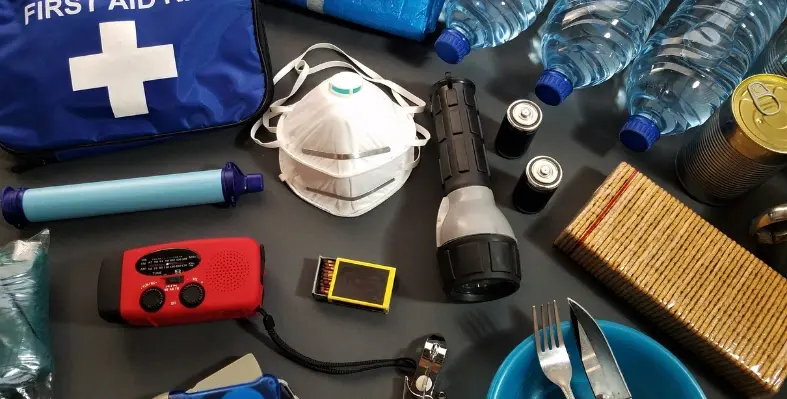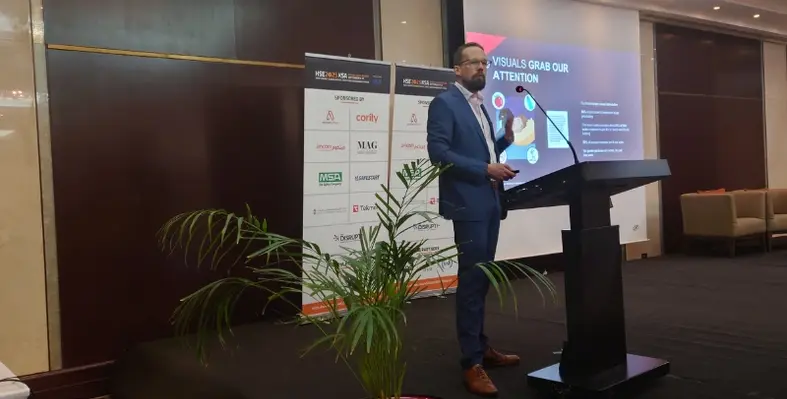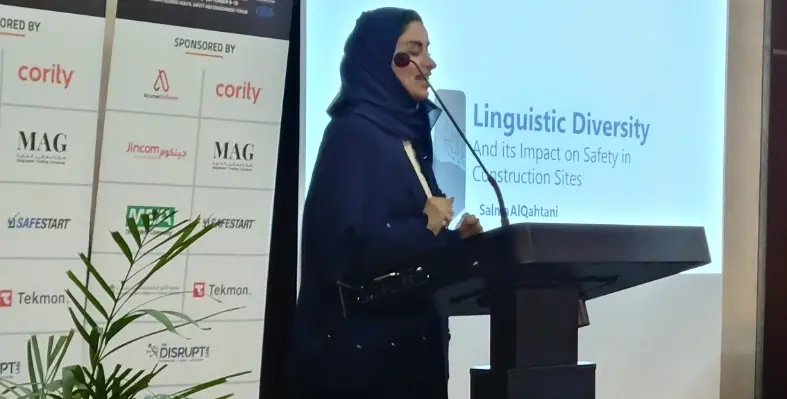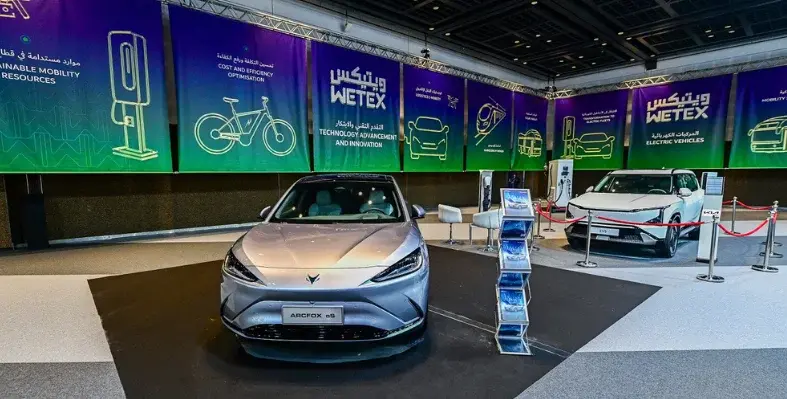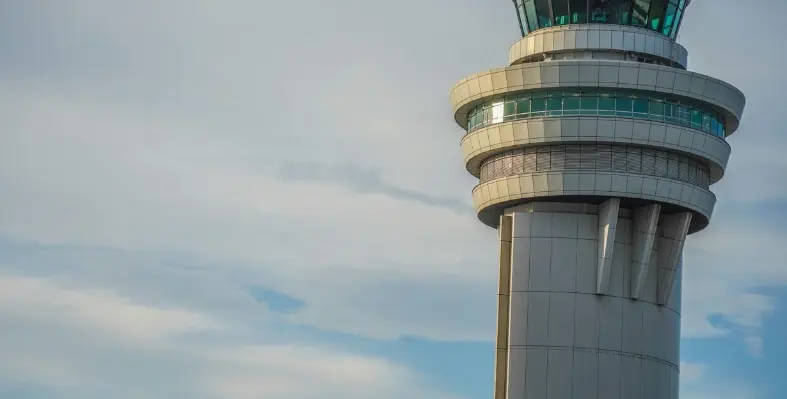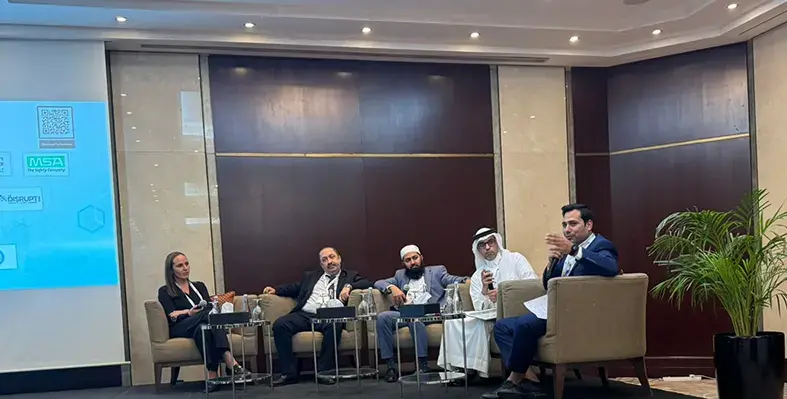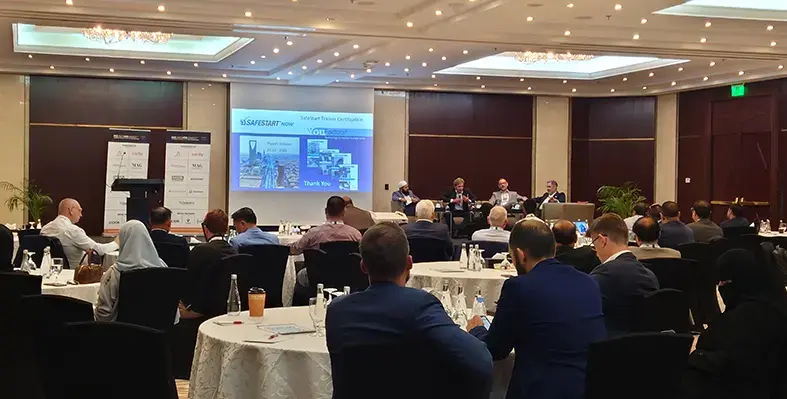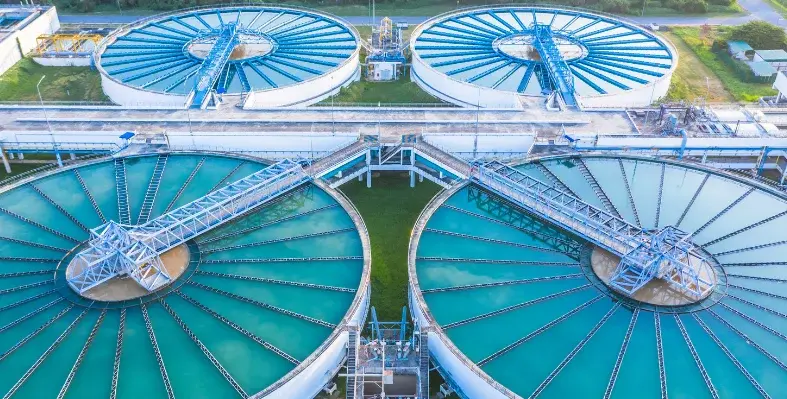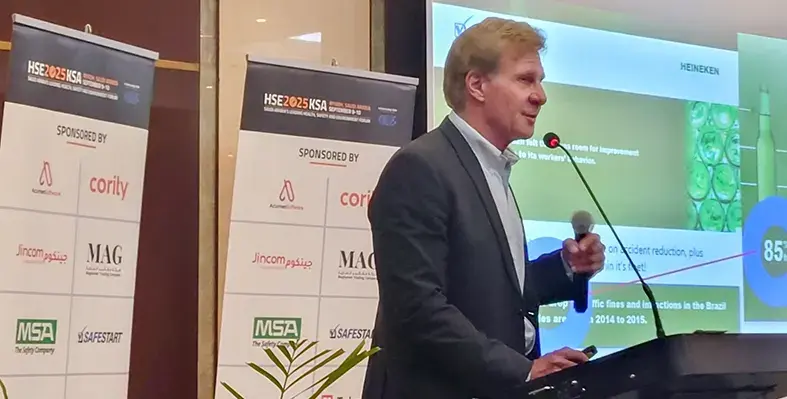Middle East
Middle East
- Topic: HSE
- Region: Middle East
- Date: 14 October 2025
- Year: 2025
EMSTEEL has won the Safety Culture and Leadership Award 2025 by the World Steel Association (worldsteel) in recognition of its Group-wide best-in-class health and safety protocols
EMSTEEL was recognised for its “AMAN 2.0 – Achieving Safety Excellence” project, which introduced a comprehensive framework integrating advanced leadership, operational excellence, and digital safety tools to drive continuous improvement.
Implemented from 2023 to 2024, AMAN 2.0 has enabled EMSTEEL to achieve tangible improvements in safety governance, employee awareness and competence, safety risk management, contractor safety, asset integrity, and process safety. The project achieved a Zero Lost-Time Injury Frequency Rate (LTIFR), a 52% reduction in Total Recordable Incident Rate (TRIFR), and marked progress across leading indicators — including a 35% increase in near-miss reporting, a 31% rise in hazard observations (from 17,500 in 2022 to 23,000 in 2024), a 100% increase in safety leadership training participation, and a 100% compliance rate in third-party safety audits and inspections.
Engineer Saeed Ghumran Al Remeithi, Group Chief Executive Officer of EMSTEEL, said, “We are honoured to win this outstanding award given by the world’s leading global steel association for the second time. At the heart of our business priorities are the health and safety and well-being of our people. AMAN 2.0 epitomises EMSTEEL’s commitment to workplace safety and continuous performance improvement, setting a new benchmark for the company’s safety excellence journey. Employee engagement, cross-functional collaboration, and senior management sponsorship remain key to its ongoing success. ”
This achievement builds on EMSTEEL's history of safety excellence, which includes receiving the Safety and Health Excellence Recognition award from the World Steel Association in 2021 for outstanding performance in Crane Operations and Rigging Safety.
- Date: 13 October, 2025
- Year: 2025
The International Code Council (ICC) successfully took part in Urban October 2025, held alongside the Home and Building Expo at the Oman Convention and Exhibition Centre from 6-8 October 2025.
During the event, the Ministry of Housing and Urban Planning (MoHUP) launched the National Building Requirements and Standards Guide, a unified framework consolidating safety, quality, and sustainability standards across Oman’s governorates.
Organised by MoHUP, Urban October brings together local, regional, and international experts to promote sustainable urban development and address the challenges and opportunities of urbanisation in the Sultanate.
At the event, ICC engaged with government representatives, industry leaders, and technical experts to advance discussions on implementing building codes, regulations, and sustainable construction practices that contribute to safer, more resilient communities.
The Council’s participation underscores its ongoing collaboration with Oman’s designated authorities to strengthen building safety and construction standards. Throughout 2024 and 2025, ICC conducted a series of workshops and training sessions in Muscat, supporting the Sultanate’s efforts to enhance safety, innovation, and sustainability within the construction sector.
- Date: 10 October, 2025
- Year: 2025
His Highness Sheikh Mohamed bin Zayed Al Nahyan, President of the UAE, has issued a Federal Decree Law establishing the Federal Authority for Ambulance and Civil Defence, alongside a Federal Decree appointing His Excellency Ahmed Ali Al Sayegh, Minister of Health and Prevention, as its Chairman.
The newly formed Authority, which enjoys legal personality, financial and administrative independence, and the capacity to act in accordance with UAE law, will report directly to the Cabinet. It replaces the Civil Defence Authority and the National Guard Command in matters related to the National Ambulance Company (NA).
The Decree Law clearly defines the Authority’s responsibilities, making it the central body for all ambulance and civil defence affairs. Its remit includes proposing and developing policies, strategies, and legislation related to ambulance and civil defence, in coordination with local authorities and relevant entities, and submitting these proposals to the Cabinet for approval.
The Authority is also tasked with assessing potential incidents, risks, and disasters, and preparing management plans in coordination with the National Emergency, Crisis, and Disasters Management Authority. Risk‑prevention programmes, necessary infrastructure controls, and operational plans for mitigating hazards will be developed in collaboration with competent authorities.
Important tasks
A key function of the Authority is to safeguard buildings and facilities through fire protection systems and security controls. These regulations, developed in coordination with local authorities, relevant entities, the Central Bank of the UAE, and other bodies, will be submitted to the Cabinet for approval.
Among the Authority’s core competences is the establishment of a national alert system to inform the population of potential hazards. It will also develop and supervise evacuation plans, coordinate shelter management, and work with internal security and safety systems (including oil companies, airports, and other critical infrastructure) to organise joint emergency response plans and support mechanisms.
The Authority will further oversee training and awareness programmes, including mock drills and joint exercises, for both qualified personnel and volunteers. It is charged with monitoring radiological, chemical, and biological threats in both peacetime and wartime, providing consultancy services in ambulance and civil defence, and maintaining a comprehensive database of relevant information in coordination with other authorities.
The Decree Law clarifies that while the Federal Authority assumes these responsibilities, it does not limit the powers of local authorities to implement ambulance and civil defence measures under existing legislation.
By centralising ambulance and civil defence functions under a single federal body, the UAE aims to strengthen its national preparedness for emergencies and disasters, enhance coordination across authorities, and ensure the safety of residents and critical infrastructure nationwide.
- Date: 7 October, 2025
- Year: 2025
Jonathan Chipps, managing director at Jincom Arabia, delivered a compelling presentation at the HSE KSA Forum in Riyadh, focusing on transforming health and safety training through visualisation and digital engagement.
His core message centred on making technical safety content more accessible, engaging, and understandable for diverse workforces.
Chipps highlighted a critical challenge in safety training: technical content developed by subject matter experts is often complex and difficult to comprehend, especially for workers from different linguistic and educational backgrounds. He emphasised that migrant workers are 66% more likely to make mistakes due to instruction misunderstandings and four times more likely to experience fatal accidents.
The solution, according to Chipps, lies in visualising and simplifying technical content. He explained that human brains are wired to process visual information rapidly, since we remember 65% of visual content compared to only 10-20% of text or verbal information. By transforming dense technical manuals into graphic-rich, simplified formats, organisations can dramatically improve safety comprehension and engagement.
Chipps showcased various visualisation techniques, including:
- Visual standards
- Short animated videos
- Interactive e-learning modules
- Toolbox talk guides
- Virtual reality training content
- Multilingual safety materials
"It's about making sure that you're taking technical information and making it relevant, engaging, and easily understood," Chipps said.
Delivering safety information
He also stressed the importance of digital content delivery, enabling organisations to track training engagement, ensure consistent messaging across multiple contractors and languages, and integrate safety content with existing management platforms.
Practical examples from projects with Neom and Red Sea Global demonstrated how Jincom develops comprehensive safety content libraries translated into multiple languages, using minimal text and powerful visuals to communicate critical safety information.
Chipps highlighted his philosophy: "Pictures speak the most universally understood language," echoing Walt Disney's perspective on visual communication.
Chipps concluded by emphasising that effective safety training is not complicated, as it requires simplifying technical content, visualising key messages, translating materials, and digitising delivery mechanisms to ensure maximum comprehension and engagement across diverse workforce populations.
His presentation offered a innovative approach to reimagining safety training, moving beyond traditional text-heavy methods to create more intuitive, memorable, and impactful learning experiences.
- Date: 10 October, 2025
- Year: 2025
Salma Alqahtani, OHS training quality assurance manager at Diriyah, delivered a compelling presentation on linguistic diversity and its critical impact on safety in construction sites at HSE KSA 2025 held in Riyadh from 9-10 September.
Her talk highlighted the complex challenges arising from multilingual and multicultural workforces in the construction industry, particularly in rapidly expanding markets like Saudi Arabia.
The core of her presentation focused on how language barriers can significantly compromise workplace safety. She emphasised that construction is an inherently risky and dynamic industry, where workers from diverse linguistic backgrounds often collaborate in high-stakes environments.
Her research revealed that linguistic barriers were the second most significant cause of poor communication in workplace settings.
Mitigating risks
Alqahtani identified several key language-related challenges: the absence of a lingua franca, worker illiteracy, and poor text readability. She noted that approximately 30 million adults with lower literacy skills work in high-risk jobs, creating substantial safety risks.
Her proposed solutions were innovative and practical. She recommended using:
- Pictograms and visual aids
- Adult learning theory in safety training
- Digital learning technologies
- Augmented reality and interactive training modules
Alqahtani encapsulated her core message, saying, "what is not looked for is not found. Language problem-related accidents wouldn't be acknowledged, and neither associated risks will be managed."
She also shighlighted her approach to effective training, adding, "investment in learners is always repaid in the long term, especially if you're thinking of reducing the cost of accidents and injuries that would come later if safety training wasn't as effective as intended."
Alqahtani's background in linguistics and translation studies uniquely positioned her to address these challenges. She advocated for tailored training approaches that consider workers' specific cultural and linguistic contexts, emphasising the importance of understanding why safety matters to adult learners.
Her recommendations included enforcing a single workplace language, developing training materials in workers' native languages, and creating interactive, engaging safety programs that leverage visual learning techniques.
The presentation was a crucial exploration of how linguistic diversity can be transformed from a potential safety liability into an opportunity for more comprehensive, inclusive workplace safety strategies.
- Topic: HSE
- Region: Middle East
- Date: October 3rd, 2025
- Year: 2025
DEWA's Water, Energy, Technology and Environment Exhibition (WETEX) took place from September 30th to October 2nd, 2025, in Dubai.
The show hopes to keep pace with rapidly shifting global trends—especially in the tech and environment spaces—by collating some of the world's most forward-thinking innovations and organisations at the Dubai World Trade Centre.
2025's edition was especially forward-thinking: AI-powered innovations in clean energy, green mobility and digital transformation earned a notable presence on the show floor.
Interactive initiatives hoped to embed the exhibition's forward-thinking vision into co-operative efforts and partnerships in green finance and health and safety.
HE Saeed Mohammed Al Tayer, DEWA CEO & MD and founder/chairman of WETEX, celebrated 2025's iteration of WETEX. "The development of WETEX reflects the unprecedented development witness by the UAE... this exhibition consolidates the UAE’s position as a reliable partner in efforts to shape a more sustainable and resilient future for all, by pushing our thriving economy towards new horizons, empowering national and local companies, and strengthening our nation’s economic, trade and investment partnerships with countries around the world."
- Date: 30 September, 2025
- Year: 2025
Red Sea International Airport (RSI), operated by daa International, has signed a multi-year collaboration agreement with Honeywell to strengthen safety and security at the Kingdom’s next-generation airport.
Under the agreement, Honeywell will supply advanced building automation systems covering safety, security, and building management. These technologies are designed to enhance resilience across the terminal, safeguard passengers and staff, and ensure smooth operations as RSI prepares to welcome more than one million visitors by 2030. The collaboration will also create nearly 50 new jobs, with a strong focus on developing local talent.
Andrew Tyler-Smith, chief executive officer of Red Sea International Airport, said, “Red Sea International Airport is designed as more than just a gateway - it’s an extension of the hospitality and innovation that defines The Red Sea destination. Our collaboration with Honeywell reflects that vision, as we integrate global expertise with daa International’s operational leadership to ensure our guests and airline partners experience a seamless, secure, and technologically advanced journey.”
Nabil Cheqroun, vice president and general manager, Honeywell Building Automation in the Middle East, Turkey and Africa (META), commented, “This agreement underscores Honeywell’s commitment to accelerating Saudi Arabia’s digital infrastructure transformation. By bringing our integrated, smart and secure systems to Red Sea International Airport, daa International will have the tools it needs to help deliver its mission of providing travellers and operators with world-class aviation facility.”
With Honeywell as a key technology partner, RSI is reinforcing its commitment to creating a safe, secure, and efficient airport environment that sets a new benchmark for aviation in the Kingdom.
- Topic: HSE
- Region: Middle East
- Date: 01 October 2025
- Year: 2025
At HSE KSA, held in Riyadh from 9-10 September, a panel session explored issues surrounding subcontractor safety, competency and innovation
Key takeaways included the importance of a robust procurement process, the role of technology solutions, such as computer vision AI for HSE compliance, and the need for consistent training and competency assessment.
Syed Mazhar, director HSSE, Al Bawani, moderated the discussion, highlighting the importance of the subcontractors’ management system, and was joined by panelists from leading companies, including Mace, Ayar International Contracting Co (AICC), Disrupt Labs, and Rua Al Madinah Holding.
The panel emphasised the role of joint audits, engagement and leadership, among other measures, in order to improve overall safety culture.
The discussions also touched on the balance between project costs and safety, and the importance of self-driven HSE standards, while metrics such as Lost Time Injury (LTI) rates and safety statistics were highlighted for evaluating subcontractors.
Ideas collaboration
Technology featured prominently throughout the discussions. While the panel emphasised that technology alone cannot build a safety culture, it can provide accountability and real-time visibility.
True cultural change starts from leadership and top-down integration of HSE into business priorities was one of the overarching messages. Initiatives like digital dashboards, proactive monitoring, leadership engagement in safety discussions, and incentives for subcontractor performance were highlighted.
Benchmarking subcontractors through digital systems, consistent supply chain management, and setting internal standards — not just relying on client requirements — were also flagged. The need for uniform HSE practices across projects and locations was also raised, advocating for self-driven safety leadership rather than client-dependent compliance.
Procurement essentials
At the beginning of the panel session, Aisling Padden, head of HSW, Mace, and based in Riyadh, underlined the importance of embedding health and safety right from the very start of the procurement process.
“From a consultant’s point of view, the procurement process is the starting point for us. It’s our first opportunity to get it right— so making sure health, safety and wellbeing gets on the assessment criteria, and that it's not just ‘lip service’ — but how are you actually going to deliver this?”
With such complex and costly projects now being underway right across the kingdom, Padden said that asking the right questions of contractors right from the start is an essential requirement.
“Another thing we do, when we get to the shortlist stage with our preferred bidders, is getting out there, and actually seeing what they do elsewhere — so, show me how you're doing this somewhere else. So you can walk around a project, and see if something has been staged for the occasion, or if it looks like it's actually embedded into their culture and their system.”
Industry training
Yassir Alsharif, head of HSSE, Rua Al Madinah Holding, also emphasised the importance of focusing on subcontractors and their practices, since they are the ones that perform the actual work and often present the highest risks.
He also highlighted issues like fake certifications and unqualified workers, which are common among short-term subcontractors, underlining the need for robust HSE procedures.
Ultimately, the goal is to ensure workers and supervisors understand the risks, and that any gaps should be addressed through targeted, on-the-job training programmes.
“So this is the kind of thing that we have got to focus on, to look at the risk, see what are the main risk-associated activities, and have a specific training programme for these workers.”
The role of technology
Alsharif outlined how the adoption of technology has aided health and safety efforts across the procurement process.
“Using manual processing for monitoring in HSE compliance, less than 1% of risks are being identified, which means it’s an iceberg problem. If we are seeing 20 incidents happening, it means 200,000 near-miss risks are there.”
This is where smart technology can play role, according to Alsharif. “For example, we are providing computer vision solutions, like smart cameras, to aid HSE compliance. If you have the right infrastructure on construction sites, this can help to identify PPE compliance, unsafe behaviours or process violations, for example.”
Alsharif cited the findings of various industry reports showing how the use of similar technology had already yielded a positive impact in terms of the reduction in incidents and lost time on site. Major companies like Saudi
Aramco have now issued an official memo to oil and gas firms to deploy AI in HSE on their rigs, he noted, suggesting that the trend is long-term and advancing steadily.
Perpetual learning
Rounding up proceedings, panel chair Mazhar outlined how important it was for HSE to be self-driven, within the entity itself, rather than purely client-driven. “The commitment should come from the main contractor, from the sub-contractor management or leadership, rather than relying only on a client.”
It was a sentiment agreed on by Eyad Sallam, corporate QHSE director, AICC. “We have our own stringent standards as a main contractor. So, each main contractor or even subcontractor, if they have good competency, they should have their own HSE management system, not be driven by client or consultant.”
There is always scope to improve and learn from others, however. “Some multinational clients who we deal with, a lot of them may have better systems than us, so we are happy to comply with their systems in these instances.”
Practical steps
• Implement a digital platform to track subcontractor safety performance metrics and automate alerts for proactive monitoring.
• Establish a joint audit programme involving the PMC, main contractor, and subcontractors to identify and address safety gaps.
• Develop a subcontractor safety scorecard with incentives and penalties to drive continuous improvement.
• Conduct weekly safety workshops with senior leadership from the client, consultant, and contractors to drive safety culture.
- Topic: HSE
- Region: Middle East
- Date: 26 September 2025
- Year: 2025
At HSE KSA, taking place from 9-10 September in Riyadh, a panel discussion took place on safety leadership and high reliability organisations, emphasising the importance of leadership accountability in HSE.
Introducing the session and the main themes, moderator Muhammad Jawad Ali, director and board member of The Disrupt Labs commented, “Real leadership means real outcomes in HSE. So today, we'll go beyond the compliance checklists and talk about how leadership accountability can transform safety from a policy to live cultures from the board room to the site."
Accountability in practice
Simon Watson, chief HSSE officer, ACWA Power addressed the question of what accountability in HSE leadership means in practice, embedding accountability from the boardroom to the work site. He highlighted the importance of clarity in roles and responsibilities, from the board and CEO all the way through to the front line workforce, describing how ACWA Power had focused on the 10 most important safety tasks for each role, with KPIs created to measure performance. This approach is also adopted with its contractors and EPCs, with health and safety milestones and deliverables tied back to monthly milestone payments. These focus on the 10 most critical factors that are causing the most issues reputationally and from a safety outcome standpoint, including critical risk management performance and welfare and accommodation standards, with payments withheld for non-compliance.
Watson also suggested measures to ensure fairness and consistency in accountability conversations throughout the organisation.
Through its ‘Year of Accountability’, starting in 2025, the company had reset the bar, clarifying the company’s priorities and how they should be cascaded throughout its supply chain, he added.
Top-down versus bottom-up
Larry Wilson, CEO SafeStart highlighted the challenges of focusing solely on a top-down approach and relying on first-line supervisors to communicate safety messages effectively.
“If you’re going to have a positive and proactive safety culture it has to have some support from the bottom up,” he said, noting that first line supervisors may be stressed, overworked and may not necessarily have the right skill sets or communication skills.
Cultural differences in the Middle East were addressed, when it was pointed out that leadership tours can influence safety culture positively, and can become learning opportunities. Robert Munn, senior VP HSE, Sports Boulevard Foundation shared examples of leadership tours being reframed as engagement opportunities to build trust and accountability, for example when a leader follows up on a problem reported to them.
Discussing the blame culture and culture of fear still prevalent in the Middle East, he said, “Yes, we need to hold people accountable, but we don’t need to blame people. There’s a difference.” Building trust and creating a no-blame environment where people feel free to discuss issues openly takes time and does not happen overnight, he added.
Prioritising safety risks
Elaborating further on the question of which safety risks to prioritise and how leaders can ensure systematic issues don’t get overlooked, Watson highlighted ACWA Power’s focus on critical risk management and measuring the presence of its critical controls.
“Risk assessment doesn’t stop a fatality, it’s the process, the things you check that do. We’re crystal clear on what’s important to us – preservation of life and assets.”
This focus is embedded throughout the organisation and its contractors in terms of accountability and performance measurement, he said.
Discussing the role leadership plays in proactively identifying and mitigating risks before they escalate into serious incidents, Munn said this starts from the top and cascades all the way down. Echoing Watson’s message on priorities, he said, “The message is very clear, critical risk management and high potential events is our main focus area.”
This message is driven down through contractor training at all levels to educate them on managing critical risks, which is linked to their monthly payments and tied into the KPIs of the Sports Boulevard leadership itself.
“It’s not about compliance from day one,” he went on. “This is a journey we’re all on together, whether we’re the client, whether it’s our PMC, whether it’s our contractors, their subcontractors and delivery partners. If one bit fails, then we all fail. So from our side, it’s around educating and coaching so it’s the contractor making those conscious decisions, and not just being driven by me and my team.”
Discussing the visibility of leadership and impact of strong health and safety leadership on the overall safety culture on construction sites and on incident rates, Munn emphasised the onus on the leadership to drive through the culture of safety, with commitment required from all CEOs working with Sports Boulevard to meet its standards and requirements.
He discussed the challenges of changing the culture of compliance and reiterated the need for leadership to be visible and felt, breaking down barriers to create a culture where conversations around health, safety and welfare can take place, thus transforming the worksite.
Safety reporting
Addressing the question of safety reporting, Watson highlighted ACWA Power’s newly-introduced Reporting Integrity Index, which measures the quality and accuracy of safety reporting, explaining how it gives a truthful picture and changes the narrative around safety performance in senior leadership meetings. There followed some discussion about the importance of focusing on adding value, holding people accountable for proactive activities and continuous improvement, as opposed to checking boxes. As Larry Wilson put it, “Our job is to make sure that those activities we’re holding people accountable for will produce a dividend.”
Watson added that the integration of AI into reporting systems which can, for example, query corrective actions and recommend better ones, giving a quality score for inputs, has resulted in a demonstrable difference in the quality of work. “It’s educating you about what good practice is every time you go into the system. It’s the biggest change in reporting I’ve seen in a decade,” he said.
Summing up, Muhammad Jawad Ali said, “Accountability in HSE is not about adding more compliance layers. It’s about embedding ownership at every level of the organisation, prioritising the risk that really matters, using structures and systems to measure and incentivise accountability, leading visibly and consistently and last, but not least, leveraging innovation and technology to stay proactive, not reactive.
“Accountability is not a report, not a KPI or a compliance audit, it’s a leadership value that must translate into daily actions. If every leader owns safety, measurable outcomes will definitely follow.”
- Topic: HSE
- Region: Middle East
- Date: September 25, 2025
- Year: 2025
A 30-year agreement sees Saudi Aramco, Marafiq, Veolia and Lamar collaborate on an industrial wastewater treatment and recycling initiative
Set to launch in Q3 2028, the partnership will jointly develop a US$500 million water recycling plant, able to process up to 8.76 million cubic metres of water annually, in the Middle East's largest petrochem hub, Jubail Industrial City.
Saudi Aramco Total Refining and Petrochemical Company (SATORP/Saudi Aramco) president Mohammad A. Al Hatlani announced the partnership. "This project is perfectly in line with the Kingdom's strategy to reduce the environmental impact of industrial activities and promote a circular economy approach.
"Veolia and Marafiq, the pioneers and leading providers of complex industrial wastewater management solutions in the Middle East, will operate the wastewater treatment plant in Jubail, leveraging their comprehensive expertise covering the entire industrial wastewater treatment chain."
Veolia CEO Estelle Brachlianoff added, "We are extremely proud to continue supporting the Kingdom of Saudi Arabia in its journey towards sustainable growth by leveraging our expertise and cutting-edge technologies in industrial wastewater treatment."
- Topic: HSE
- Region: Middle East
- Date: 23 September, 2025
- Year: 2025
The chairman of the Dubai Supreme Council of Energy (DSCE) chaired the 90th council meeting, which discussed current net zero and emissions strategies
During the meeting, the DSCE approved the Greenhouse Gas Emissions Inventory 2024, and signed off on the winners of the upcoming 2025 Emirates Energy Award, which will be announced at a ceremony next month.
Saeed Mohammed Al Tayer, DSCE vice chairman, said, "In line with the vision and directives of His Highness Sheikh Mohammed bin Rashid Al Maktoum, Vice President and Prime Minister of the UAE and Ruler of Dubai, to consolidate Dubai's global leadership in clean energy, sustainability and energy efficiency, we continue to implement pioneering projects that enhance Dubai's position as a global hub for innovation and investment in the energy sector.
"Our goal is to support the sustainability road map and achieve the Dubai Clean Energy Strategy 2050 and the Dubai Net Zero Carbon Emissions Strategy 2050 to provide 100% of the emirate’s energy production capacity from clean sources by 2050. We attach great importance to adopting best practices and advanced technologies that increase the efficiency of resource use and support Dubai’s sustainable development in line with the UAE’s national initiatives and federal strategies."
As well as HH Sheikh Ahmed bin Saeed Al Maktoum, DSCE chairman, and Al Tayer, vice chairman, the meeting welcomed the attendance of HE Ahmed Buti Al Muhairbi, secretary general of the council, and board members HE Marwan bin Ghalita, acting director general of Dubai Municipality; HE Abdulla bin Kalban, managing director of Emirates Global Aluminium (EGA); HE Hussain Sultan Lootah, acting CEO of Emirates National Oil Company (ENOC); Juan-Pablo Freile, general manager of Dubai Petroleum and Dubai Supply Authority (DUSUP); and Muna Alosaimi, chief executive officer of the Strategy and Corporate Governance Sector at the Dubai Roads and Transport Authority (RTA).
Secretary general Al Muhairbi added, "The council has approved two important regulatory frameworks for trading petroleum products in Dubai: the Safety Policy in Petroleum Products Trade Policy, which aims to ensure the highest standards of health, safety and environmental protection, and the Regulatory Framework for Petroleum Products Trade, which provides comprehensive governance mechanisms to enhance transparency, efficiency and compliance in the sector."
- Topic: Events
- Region: Middle East
- Date: 23 September 2025
- Year: 2025
As Saudi Arabia’s leading health, safety and environment (HSE) forum unfurled in Riyadh from 9-10 September, insightful panels and presentations gave an idea of the region’s evolving industry
One such session titled ‘From Human Error to Enhanced Performance: The Future of High Reliability Organisations’ spearheaded by Larry Wilson, the Chief Executive Officer of safety solutions provider, Safestart, delved into how the definition of safety has seen a marked shift in recent times.
While safety in workplaces is largely understood as ‘loss control’, with a director or vice president manning the post, focusing solely on prevention, this can pose certain limitations. Employees in a company often find themselves in a fix when trying to get the senior management engaged during loss situations.
But if safety can be taken as a means to attain enhanced performance, it unlocks a fresh perspective beyond just the prevention of injuries or loss to include reduction of human errors, allowing improved production efficiency and quality while reducing scraps and customer complaints.
Wilson spoke on how Safestart is shaping the future of safety by pushing the boundaries of loss prevention. According to him, even the hierarchy of controls in safety can’t always avoid critical errors. The firm addresses these challenges with tools that help get the mind and eyes back on the task, and get into the zone, establishing focus before delivering reliable performance. This spins the concept of loss and safety to generate production. The session also served as a glimpse into Safestart’s upcoming workshop on critical error reduction techniques that will be held in Riyadh from 21-22 October, in association with Offshore Network.
According to Wilson, in the past 25 years, over 5 million people across 75 countries are benefitting from following the critical error reduction technique, which is framed on the basis of state error pattern identification. This pattern, driven by the concept that the states come before the errors, can eliminate 95% of the injuries if identified promptly. While errors are unpredictable, ironically, the states that cause them are actually very predictable, and can be controlled by controlling the mind, moment and performance.
It is possible to anticipate errors by self-triggering on the active states – rushing, frustration, fatigue – the actual feeling in the moment. Self-triggering is the first step to following the critical error reduction approach. One has to promptly think in the lines of ‘eyes, mind, line of fire, balance, traction, grip’. Identifying state error risk patterns makes one think about the risk. In other words, keeping the worst possibilities in mind can help create a quick reflex response. However, self-triggering cannot be achieved if complacent and in a passive state, as it causes the mind to be not on task.
Wilson laid out the primary safety-related habits, based on one’s profession and lifestyle. Snowboarders/ skiers or those who work at height must test their footing and grip before committing to weight.
When driving, it is important to move the eyes first, before moving the hands, feet or body.
Spokespersons from companies which have benefitted from Safestart resources were also present during the session. American multinational corporation, Kimberly Clark, has seen a 74% decrease in recordable injuries and 20% improvement in asset conversion with Safestart’s support.
While Nucor Steel recorded a 53.5% decrease in cost per ton, Scott Forge saw a 40% decrease in customer complaints since the last two years.
Heineken in Brazil recorded an 85% decrease in lost time and recordable injuries, as well as a 50% decrease in traffic fines for their sales people.
Four out of seven plants of Quadrant Plastics saw zero recordable injuries for three years.
Speaking of Safestart’s efficiency in providing region-specific solutions, Wilson said that it is based on neuroscience and works on a train-the-trainer model. The company thus works in collaboration with local trainers to make the experience more tangible and well suited to the respective region’s workplace and culture.
